About Ronda Roundabouts (and murals)
By The Crazy Guy
19 April 2024
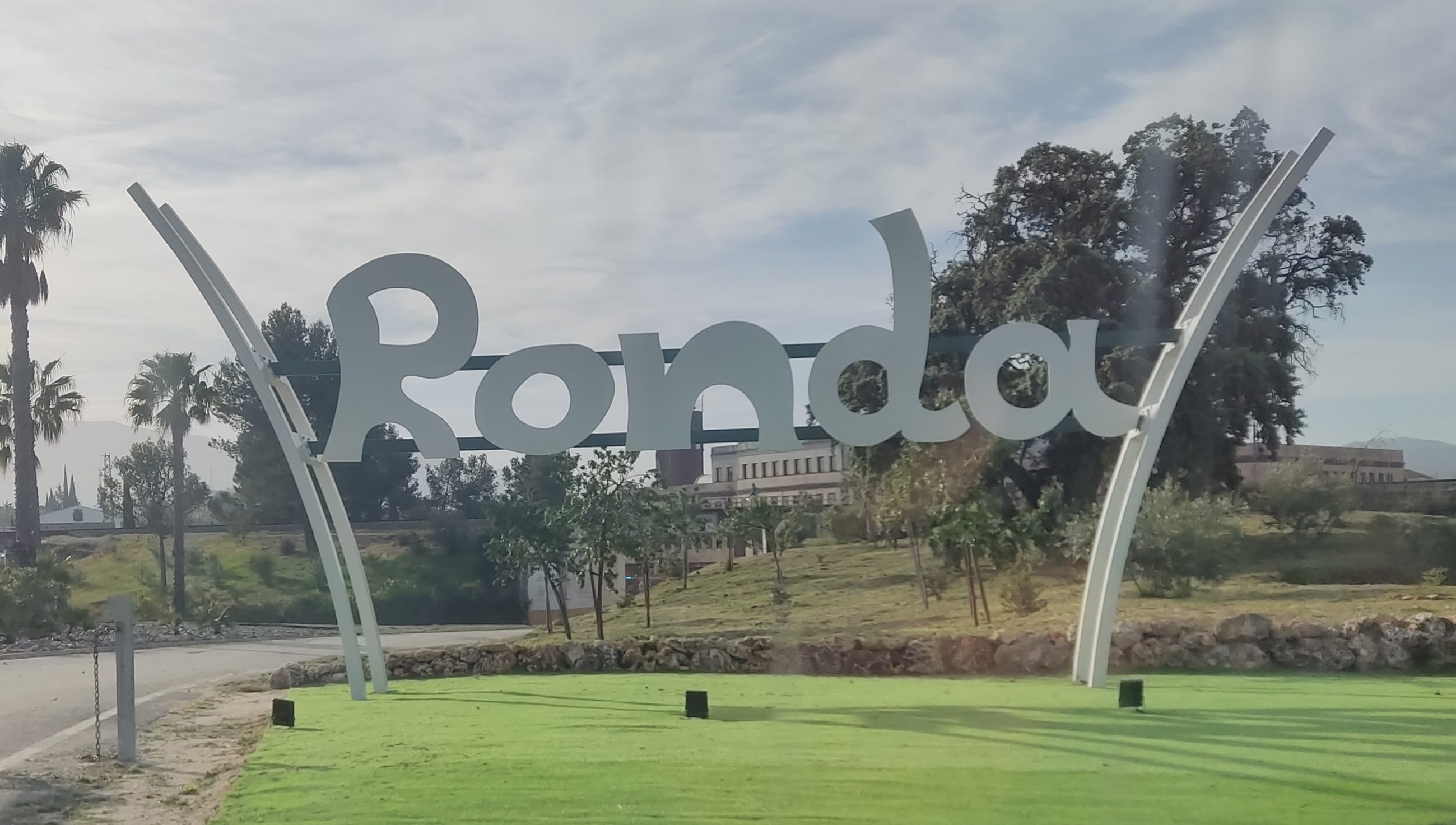 There is a roundabout at nearly every entrance to the town of Ronda (Málaga) – at all points of the compass. Each hosts a symbol or erection of some kind. Within the town itself, they’ve gone in for murals in a big way. The Crazy Guy can think of at least ten. He takes a look.
There is a roundabout at nearly every entrance to the town of Ronda (Málaga) – at all points of the compass. Each hosts a symbol or erection of some kind. Within the town itself, they’ve gone in for murals in a big way. The Crazy Guy can think of at least ten. He takes a look.
North by Northwest
Arriving on the A367 Campillos Road you drive past Bar La Fragua, or you stop and call in for coffee or breakfast to see the lovely waitress Nati. Here is also the best car valeting service in town, Lavacar – just 15€, and next door to that is is Viveros Gomez, the garden centre.
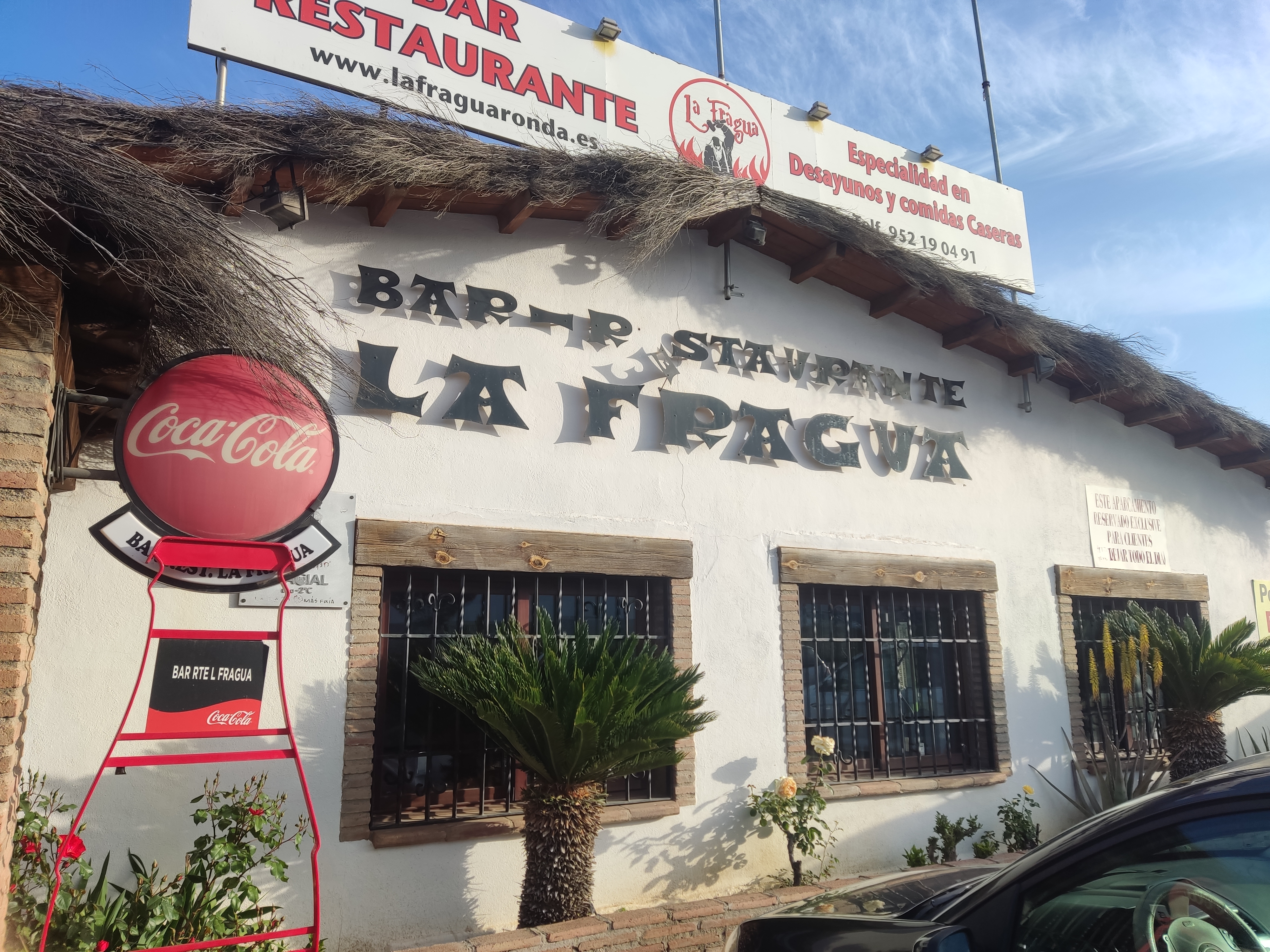
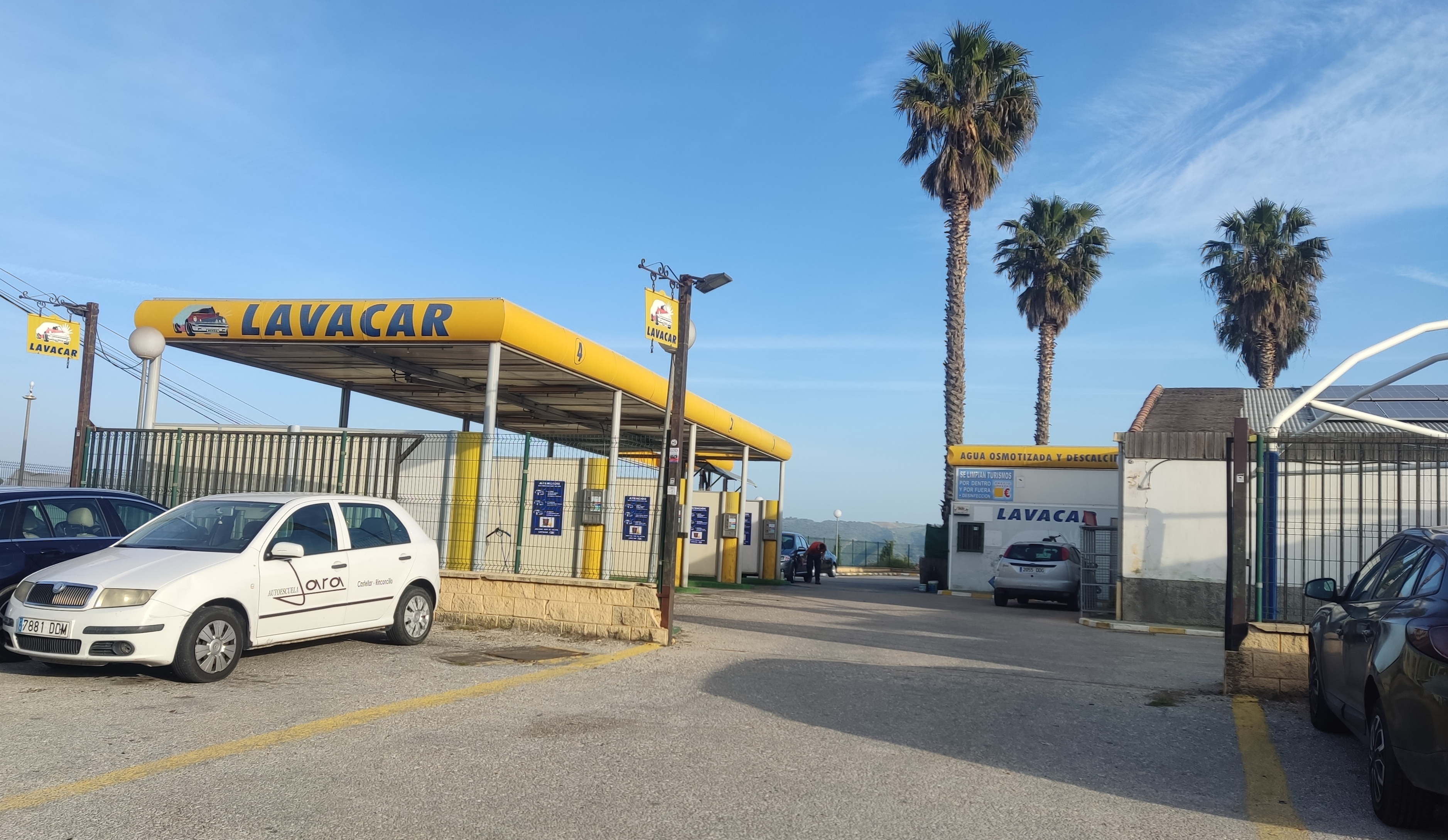
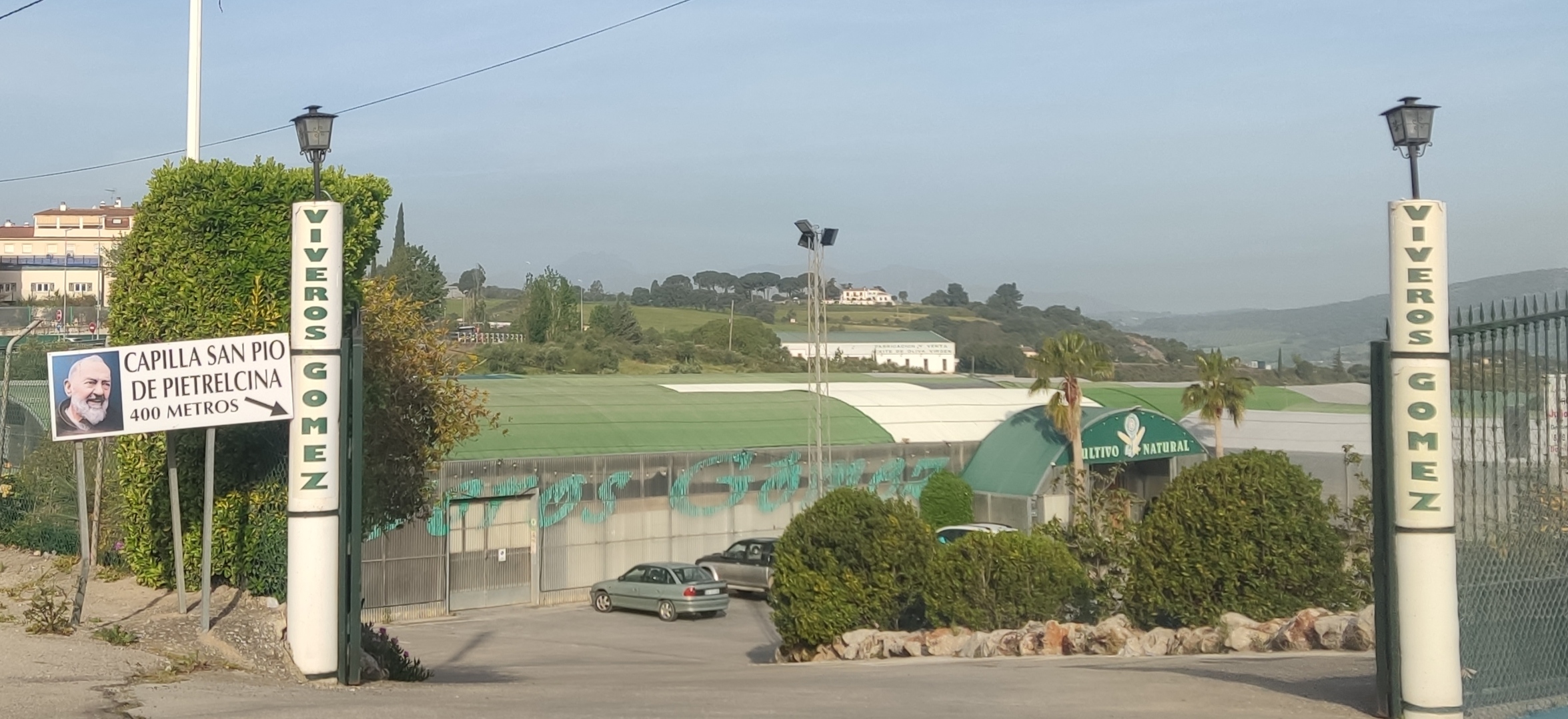
Next is the biggest roundabout of all located beneath the Algeciras to Bobadilla railway line as it heads into Ronda.
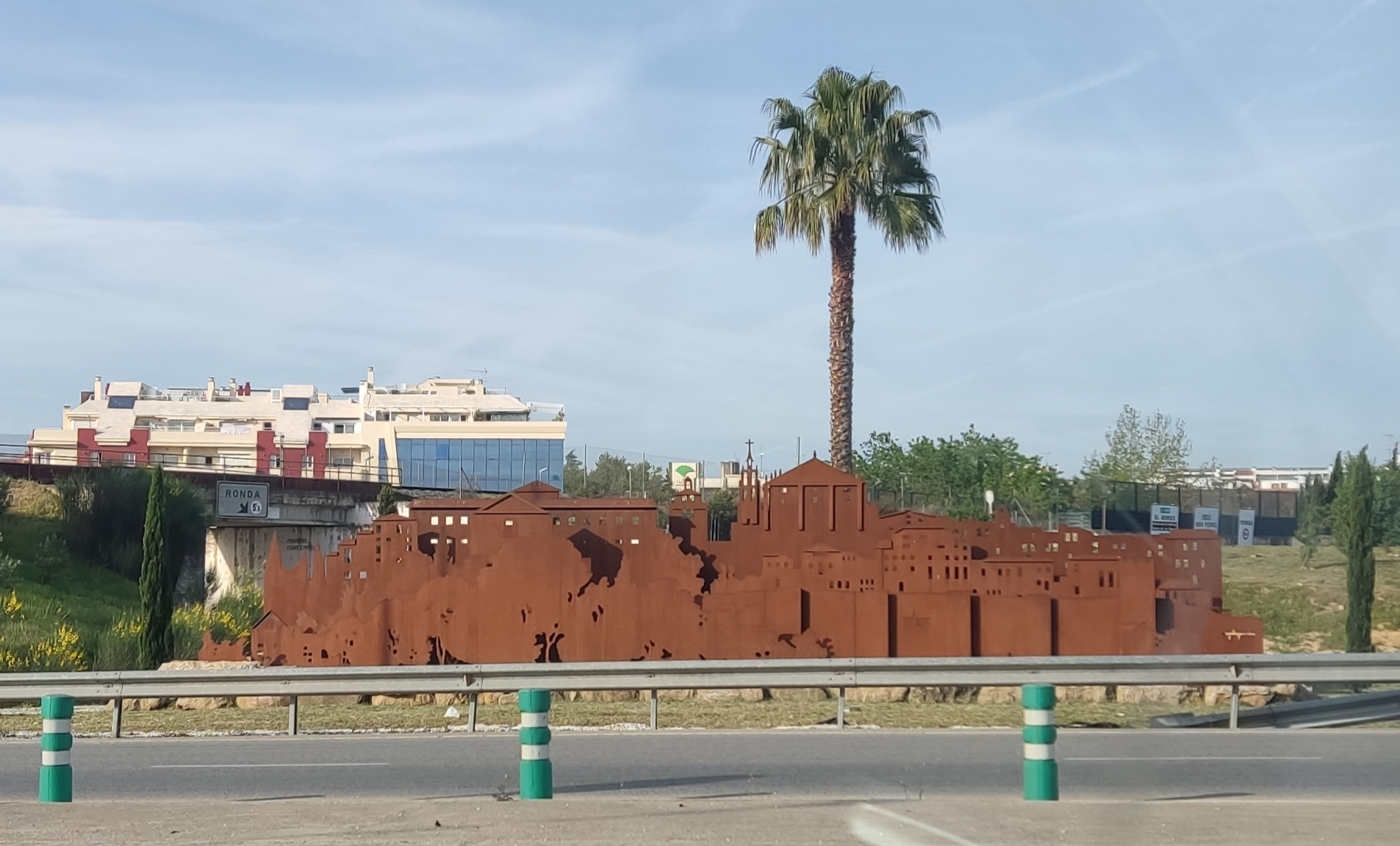 The first thing you see on this roundabout is what looks like a lump of rusty metal. On closer examination you realise it’s a silhouette of a skyline, presumably Ronda.
The first thing you see on this roundabout is what looks like a lump of rusty metal. On closer examination you realise it’s a silhouette of a skyline, presumably Ronda.
They go in for rusty stuff around here, by the way, cf. the entrance to the village of El Gastor on the Seville Road.
There is also a big sign welcoming the visitor to Ronda here (see main photo above).
As you h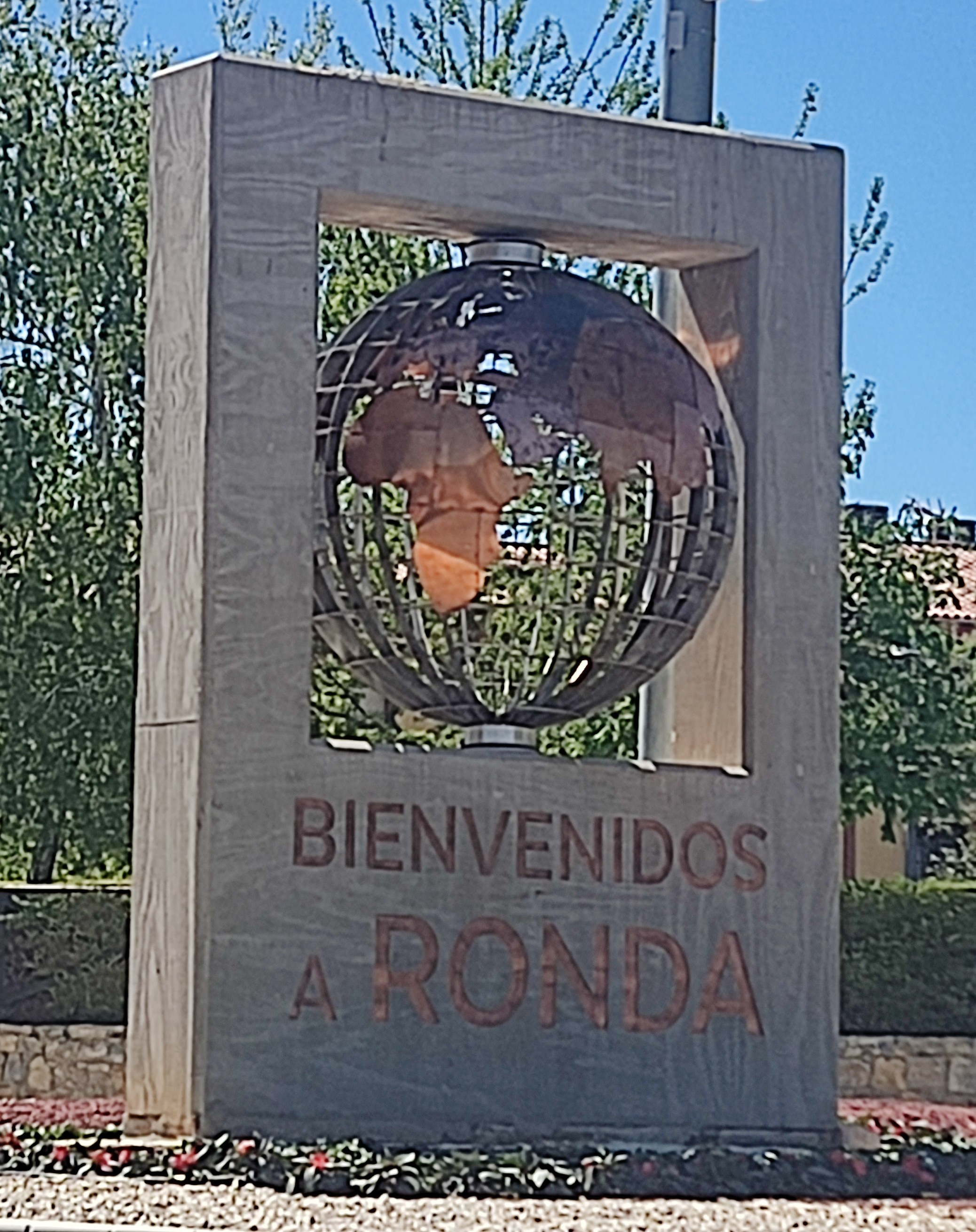 ead onto Avenida de Málaga there is another roundabout, a small one, which hosts a globe of the world and the message Bienvenidos a Ronda.
ead onto Avenida de Málaga there is another roundabout, a small one, which hosts a globe of the world and the message Bienvenidos a Ronda.
Avenida de Málaga is a rich source of murals. There are five to the right opposite the CEPSA petrol station (the dearest in town).
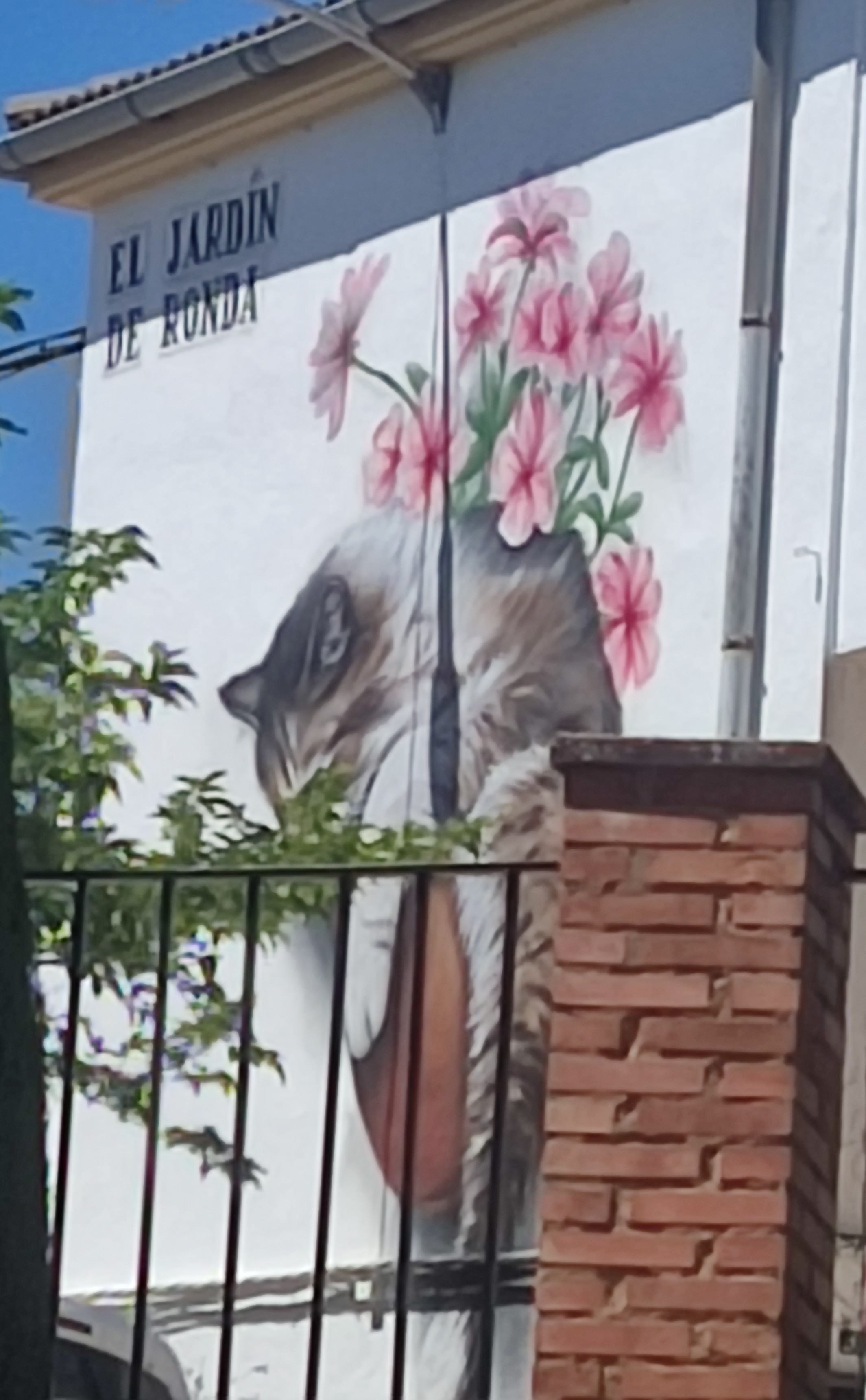
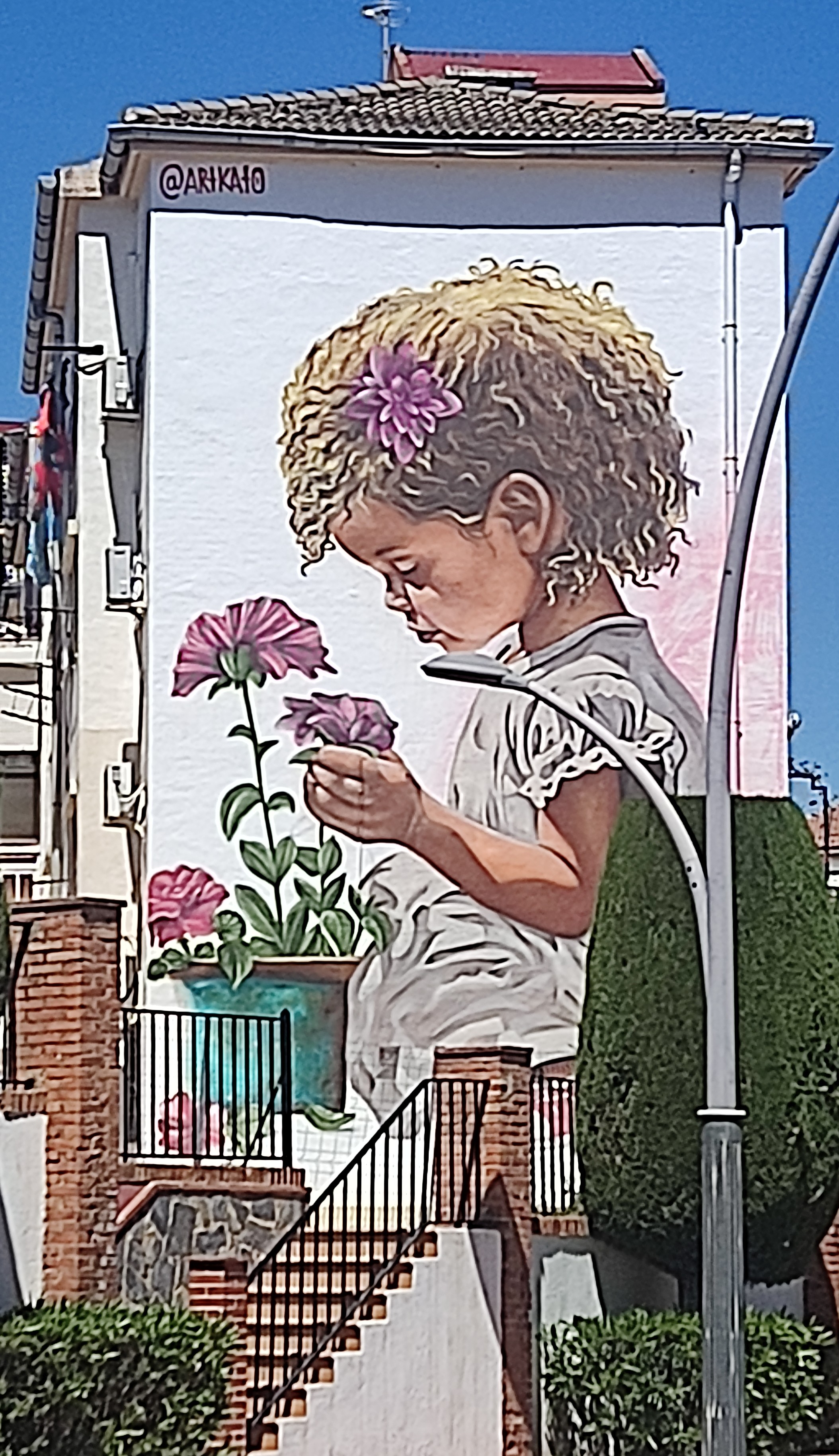
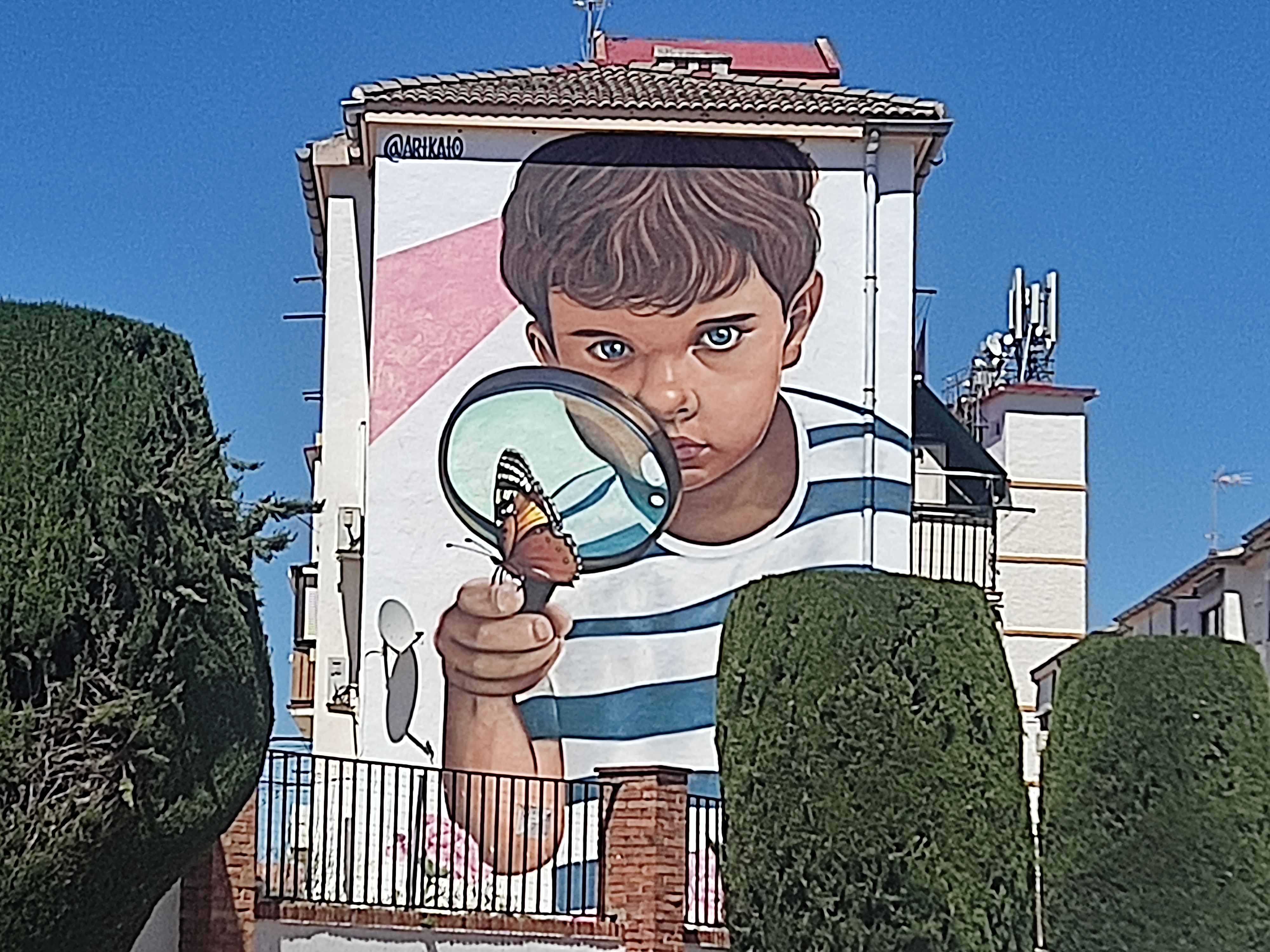
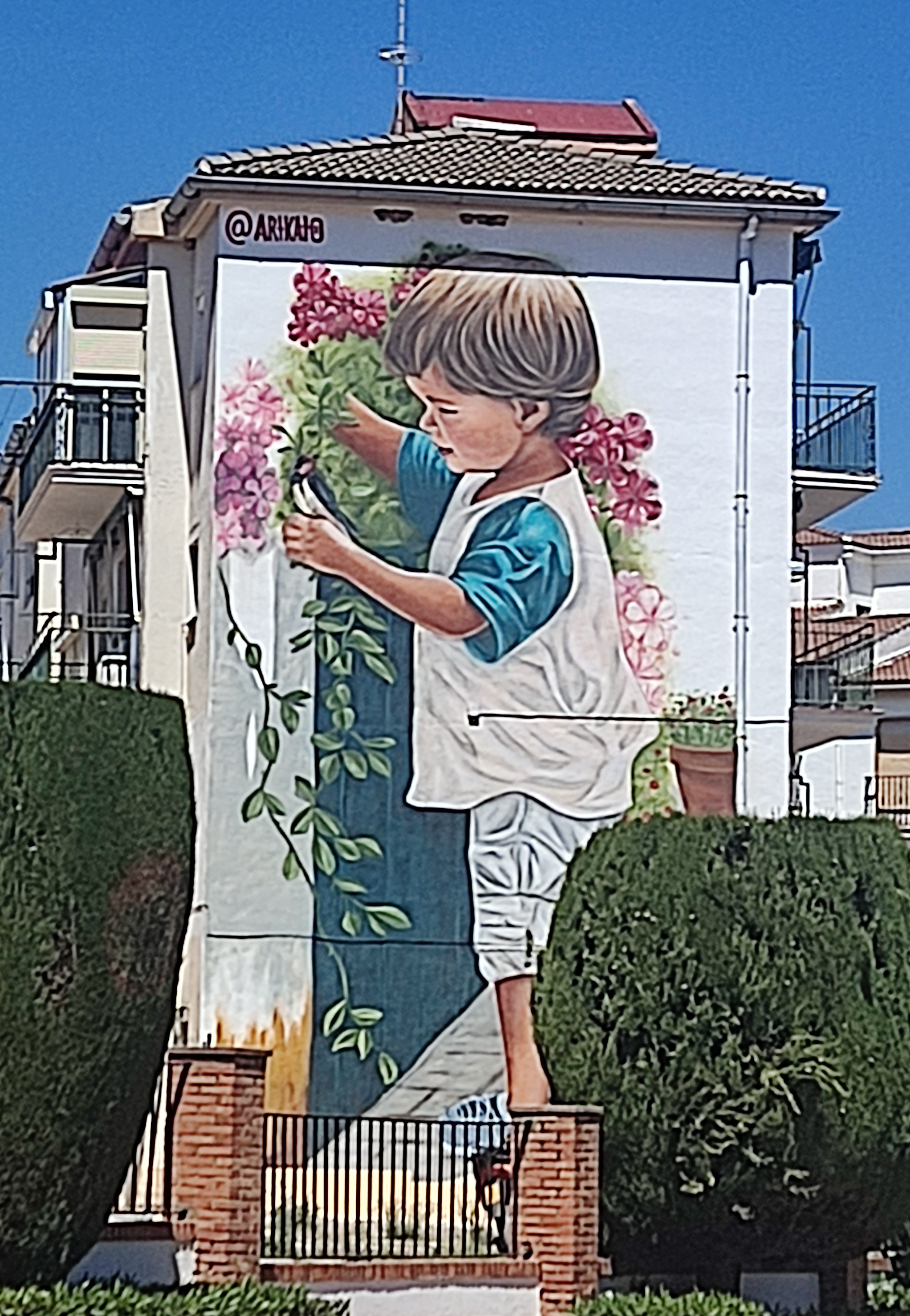
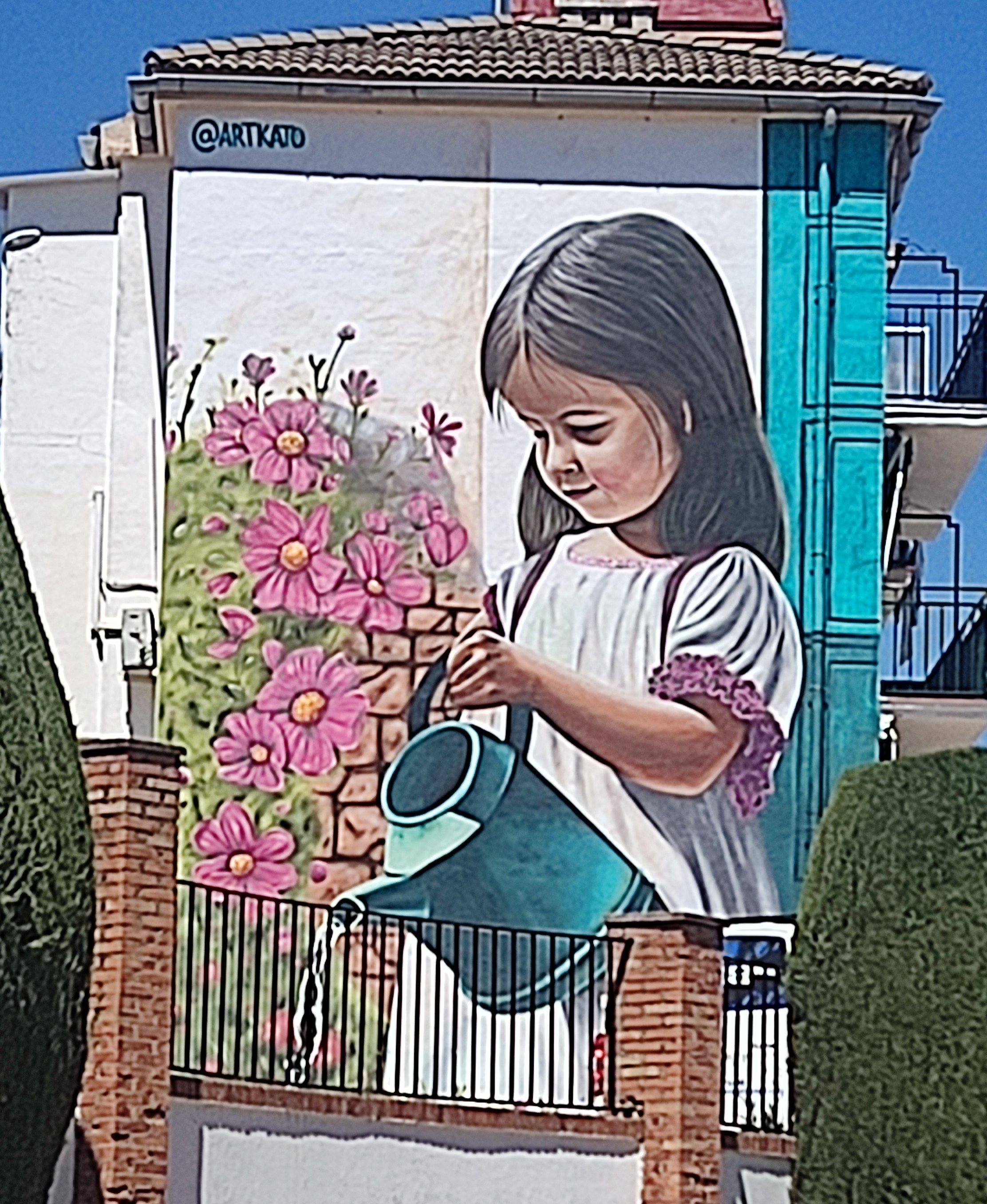
These are located on the “gable ends” of five blocks of flats and are rather charming. They are by the Basque graffiti artist Arikaio, a kind of Spanish “Banksie”, the celebrated British graffiti dauber.
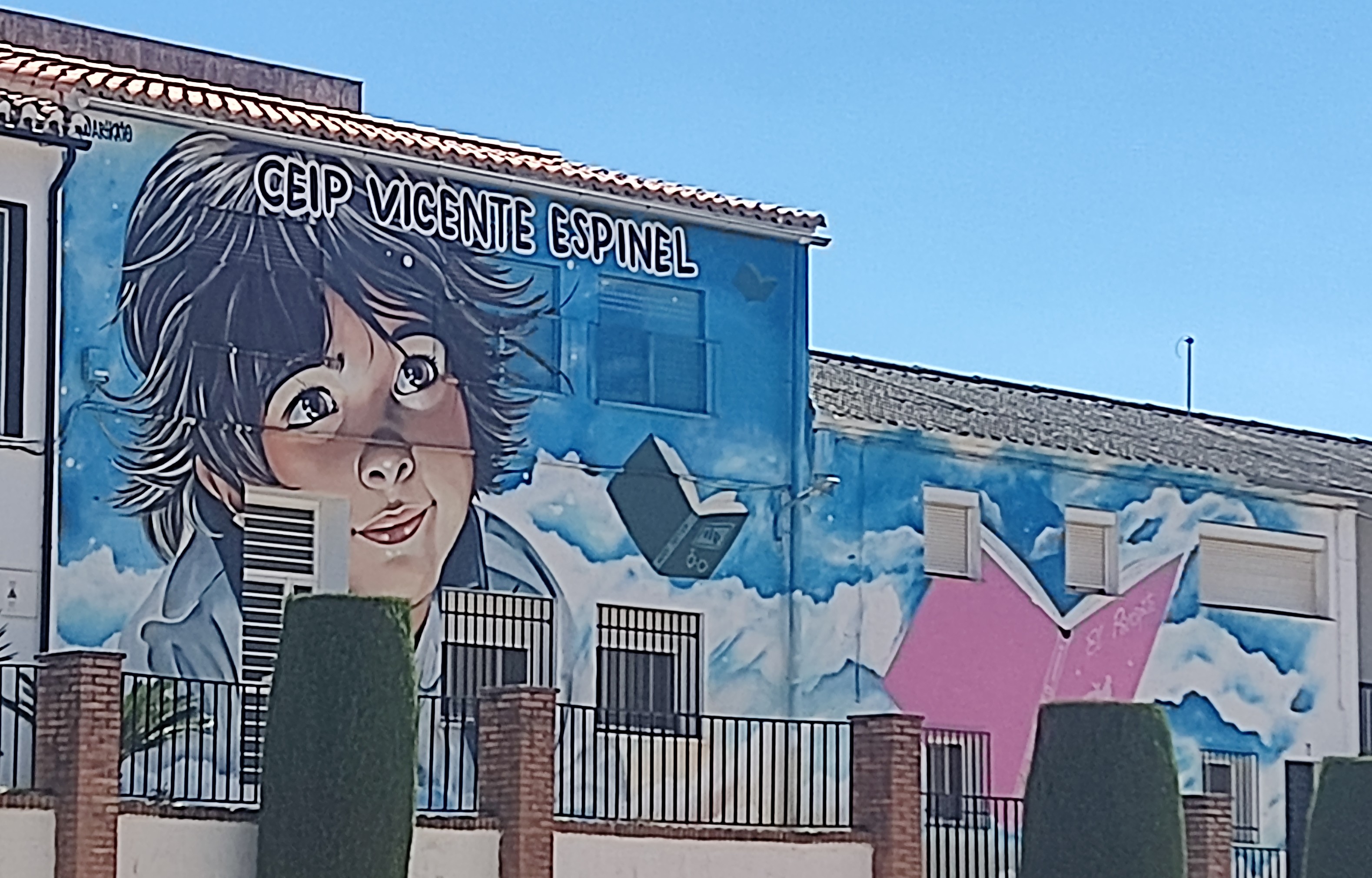
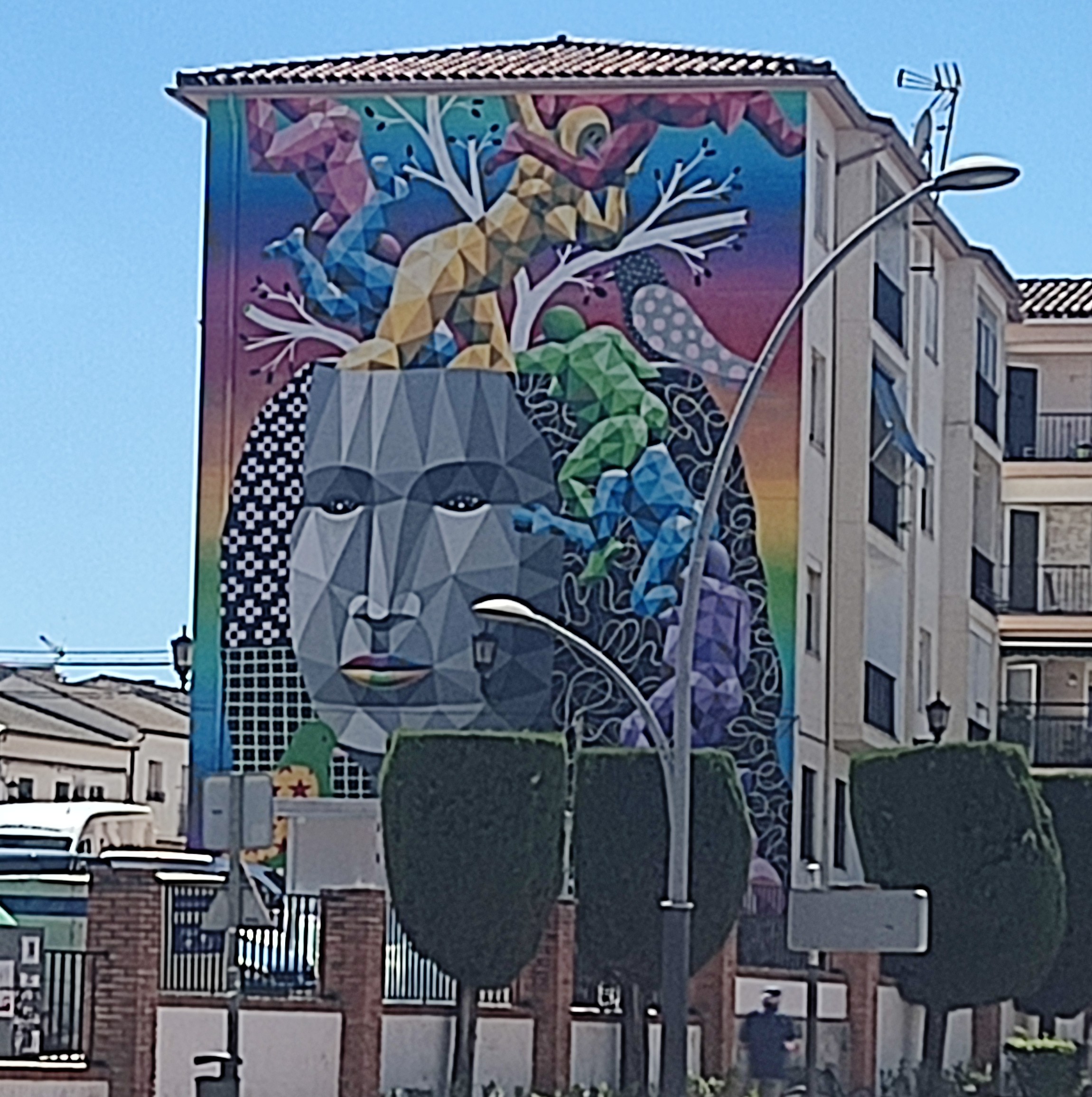
Further on, on the other side of the road, is a splendid rendition on an end wall of a Spanish señorita, the third mural in the town by artist Óscar San Miguel, also known as Okuda.
A bit further on, just past the Guardia Civil Barracks, if you look up to your left there is another mural on a primary school.
Head back to the big roundabout and take the A376 road signposted Sevilla. Almost immediately there is an exit onto the Polígono Industrial, the industrial or trading estate. No roundabout here, so no statue or symbol.
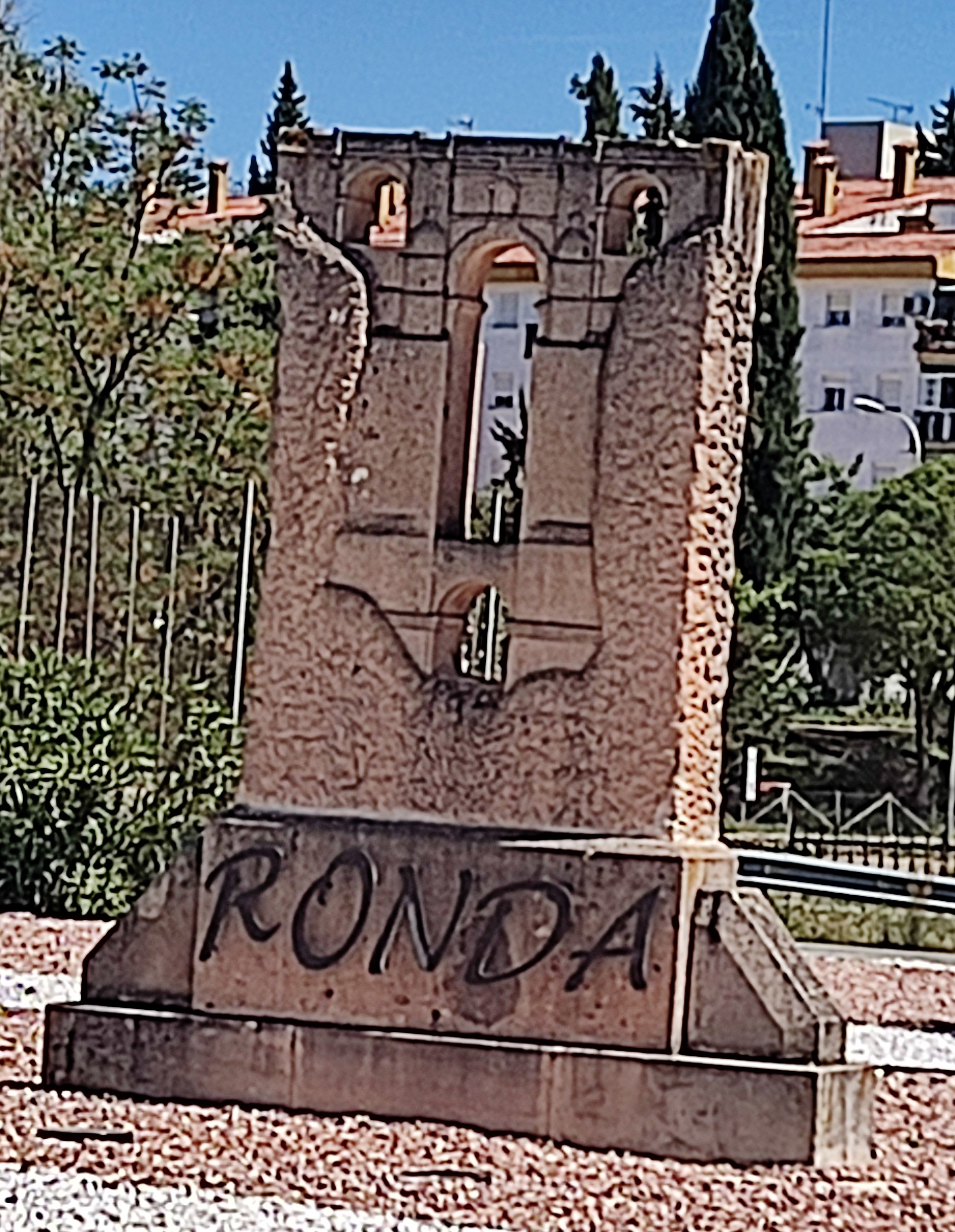 Back onto the main road and the next entrance into the City of the Tajo is the North West entrance. Here is a roundabout with a sculpture of the Puente Nuevo, the emblematic symbol of Ronda.
Back onto the main road and the next entrance into the City of the Tajo is the North West entrance. Here is a roundabout with a sculpture of the Puente Nuevo, the emblematic symbol of Ronda.
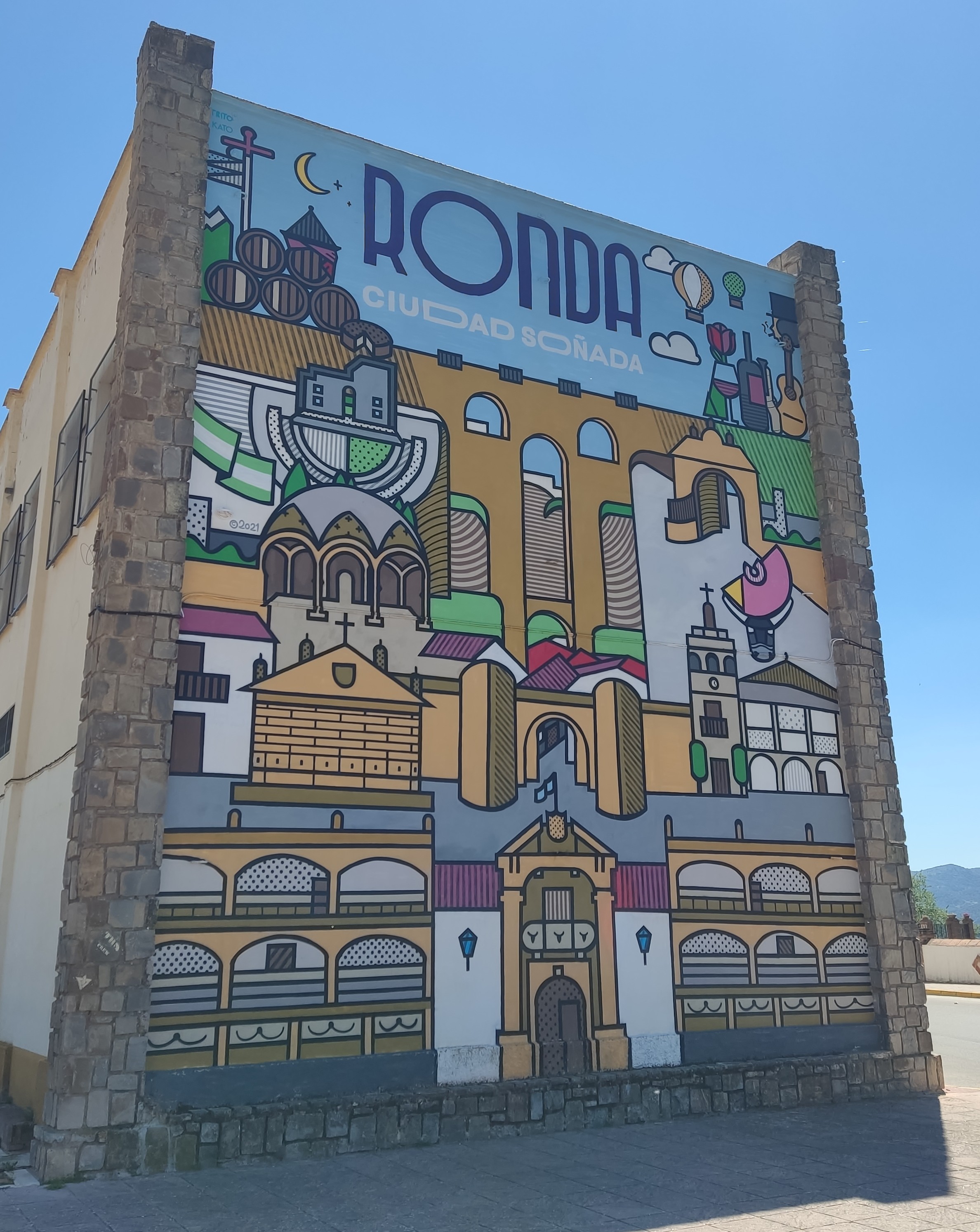 Up into Ronda, past the CEPSA gasolinera, equally as expensive as the afore-mentioned one, and the open-365-days-a-year pharmacy Farmacia Galindo and ahead of you is my favourite of all the murals, a stylised representation of Ronda, featuring all the important landmarks. Fabulous! This was created by rondeño Víctor Fernández.
Up into Ronda, past the CEPSA gasolinera, equally as expensive as the afore-mentioned one, and the open-365-days-a-year pharmacy Farmacia Galindo and ahead of you is my favourite of all the murals, a stylised representation of Ronda, featuring all the important landmarks. Fabulous! This was created by rondeño Víctor Fernández.
If you go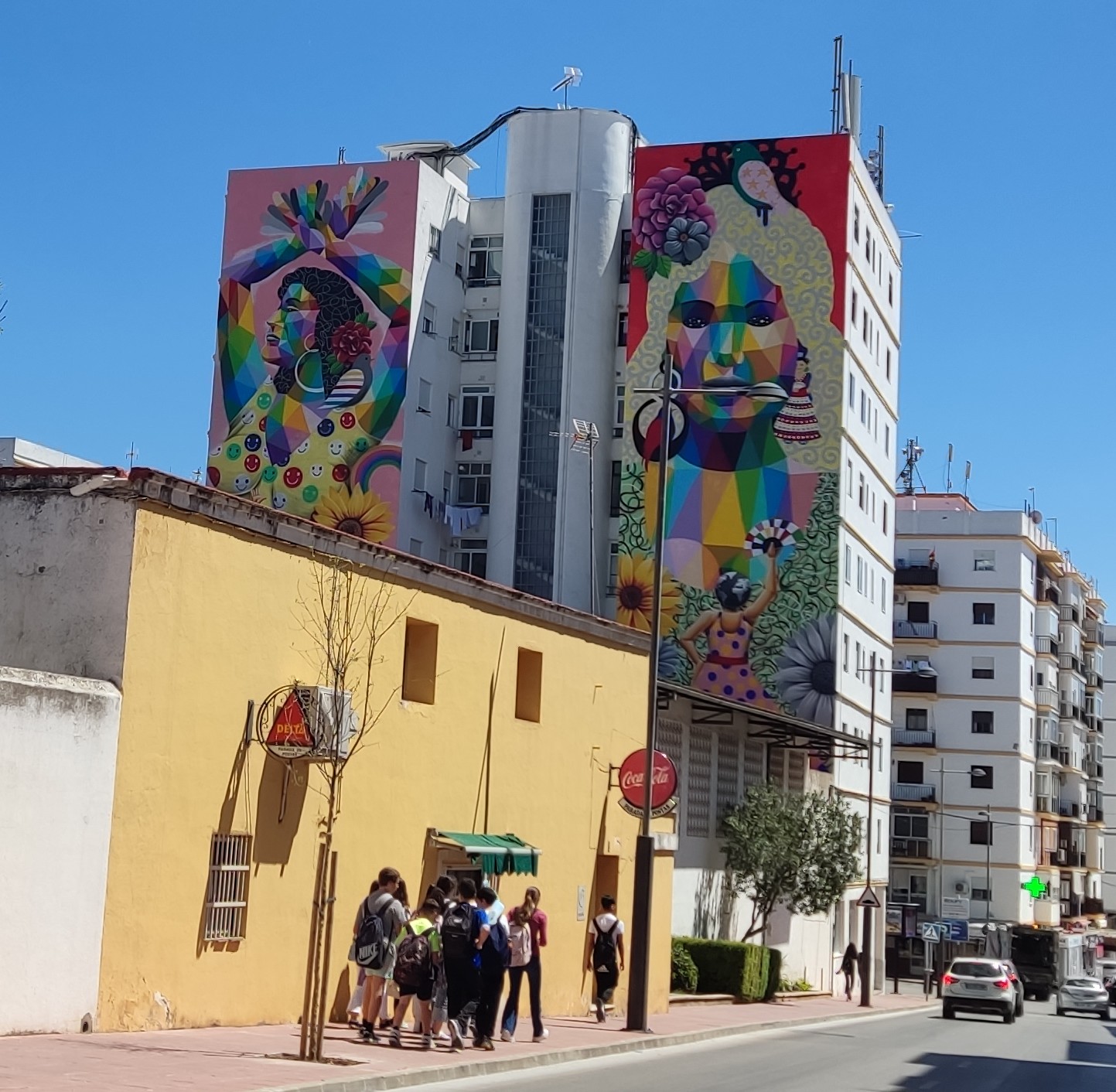 towards the bus station, on the ends of two “skyscrapers” are the first ever murals to grace Ronda. Two ladies in colourful flamenco “gear”. Wonderful!
towards the bus station, on the ends of two “skyscrapers” are the first ever murals to grace Ronda. Two ladies in colourful flamenco “gear”. Wonderful!
The artist was Okuda (Óscar San Miguel).
Heading East
Retrace your steps to the big roundabout and head past the Parque de Bomberos, Fire Station, and along the circunvalación, bypass, sign-posted San Pedro de Alcántara 50km. This is the A376.
After 400 metres there is an exit down to the roundabout near LIDL and the white elephant that is the new open-air swimming pool, which is closed for ten months of the year (Rondeños only swim from July to September, coinciding with the schools’ summer vacation).
Here there are two roundabouts in quick succession.
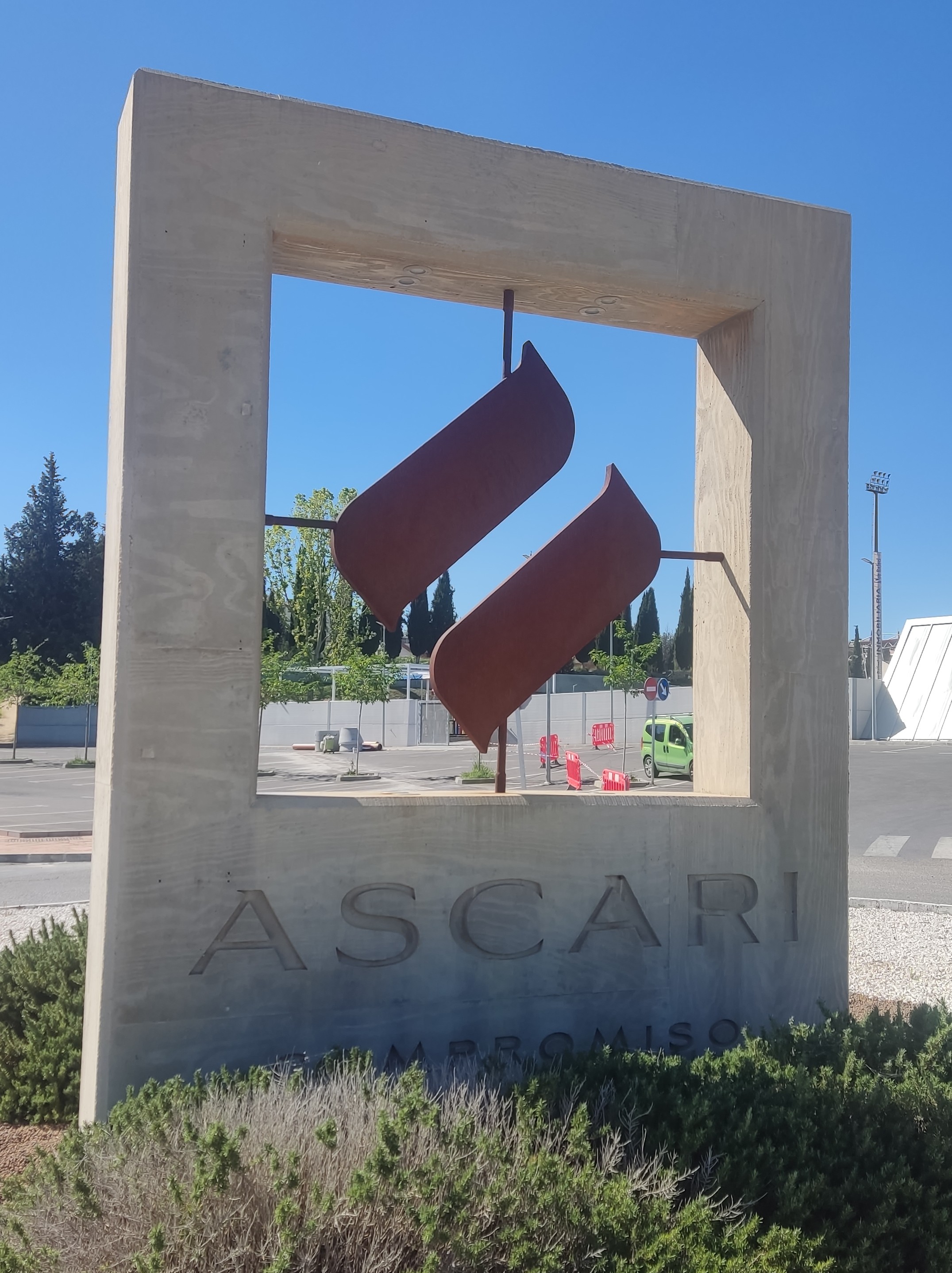
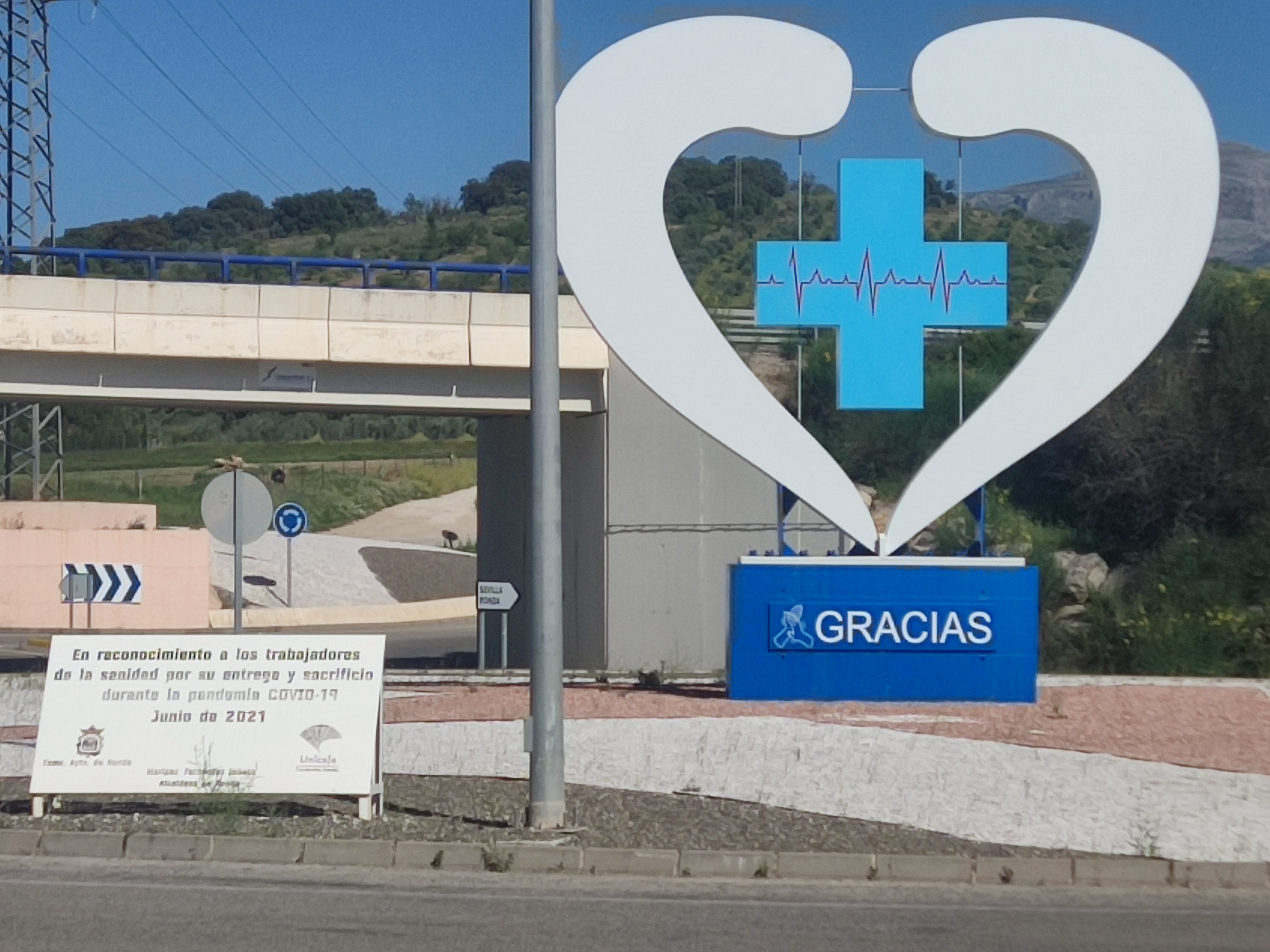 The first has an hommage to those who suffered at the hands of Covid-19, and the second an advertisement for ASCARI, the racetrack on the Campillos Road outside of town.
The first has an hommage to those who suffered at the hands of Covid-19, and the second an advertisement for ASCARI, the racetrack on the Campillos Road outside of town.
Strangely, this is dedicated to disgraced Ronda mayor, now deceased, Antonio María Marín Lara, nicknamed Toti. He was found guilty of corruption on a massive scale while in office, yet escaped gaol time.
Well, he was a lawyer. Enough said?
Down South
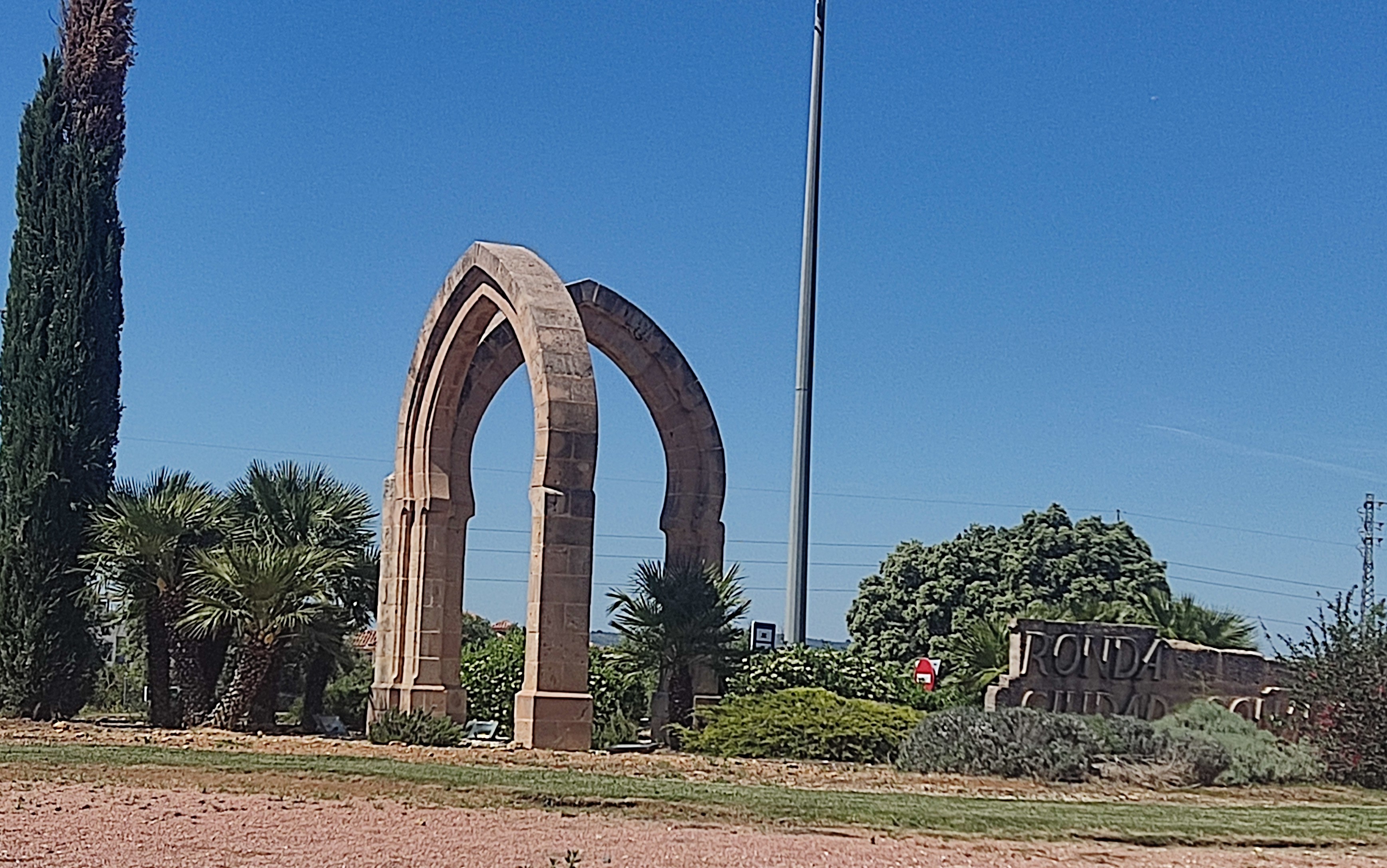 Back on to the A376 heading south, take the exit for Ronda South. On this roundabout stand two Moorish arches and the words Ronda Ciudad Soñada (a reference to Austrian poet Rainer Maria Rilke who lived in Ronda for a time and coined the phrase.
Back on to the A376 heading south, take the exit for Ronda South. On this roundabout stand two Moorish arches and the words Ronda Ciudad Soñada (a reference to Austrian poet Rainer Maria Rilke who lived in Ronda for a time and coined the phrase.
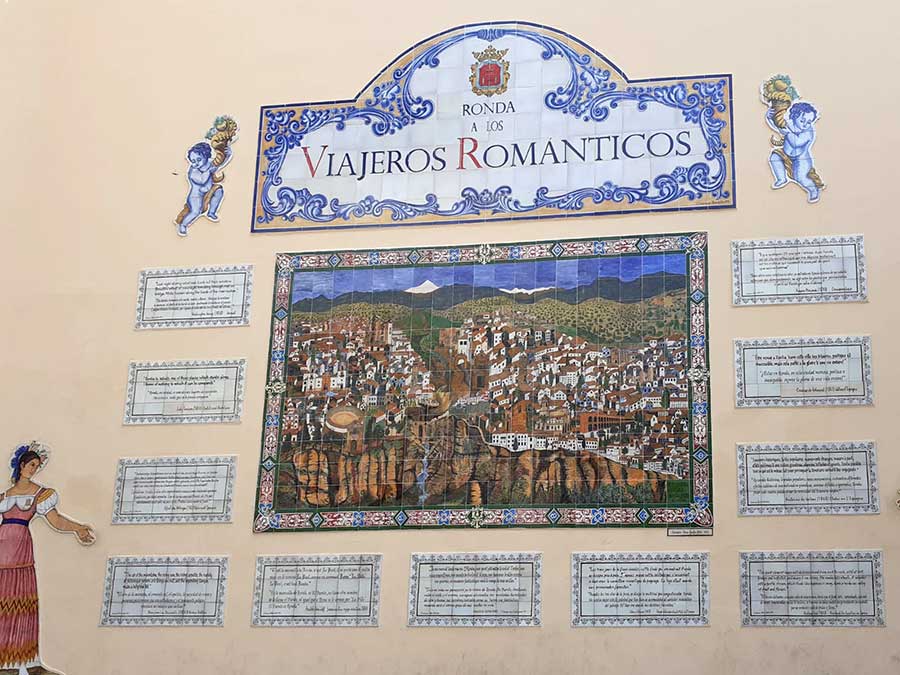 If you keep going into town, at the southern end of the Puente Nuevo opposite Calle Tenorio is a tiled mural that has been around for a few years. A tribute to the Viajeros Románticos (Romantic Travellers), it is a stylised aerial view of Ronda.
If you keep going into town, at the southern end of the Puente Nuevo opposite Calle Tenorio is a tiled mural that has been around for a few years. A tribute to the Viajeros Románticos (Romantic Travellers), it is a stylised aerial view of Ronda.
There are quotations from some of these XIX century travellers and writers, including Bécquer, Ford, Irving and Mérimée.
Epilogue
That's it folks! Ronda roundabouts and murals. Although I am The Crazy Guy, I must confess that both the roundabouts and especially the murals enhance the urban landscape of the Ciudad Soñada.
All photographs by Paul Whitelock
© The Crazy Guy
Links:
HELP ME RONDA (eyeonspain.com)
How did Ronda get the name "City of Dreams"? - Help me, Ronda (help-me-ronda.com)
‘St Michael’ comes to Ronda - Secret Serrania de Ronda
Un año sin Antonio María Marín Lara (Toti) | Diario Ronda
Tags:
A367, A376, Antonio Marin Lara, Arikaio, Ascari, Avenida de Malaga, Banksie, Basque, Bienvenidos a Ronda, Campillos, CEPSA, City of the Tajo, Ciudad Soñada, Covid-19, Crazy Guy, Diario Ronda, Farmacia Galindo, globe, grafitti, El Burgo, Help Me Ronda, La Fragua, Moorish arches, mural, Óscar San Miguel, Okuda, Paul Whitelock, Puente Nuevo, Rainer Maria Rilke, Rilke, Romantic Travellers, Ronda, rondeño, roundabout, San Pedro de Alcántara, Secret Serrania, Sevilla, Toti, Viajeros Románticos, Víctor Fernández, Viveros Gomez, www.eyeonspain.com, www.help-me-ronda.com